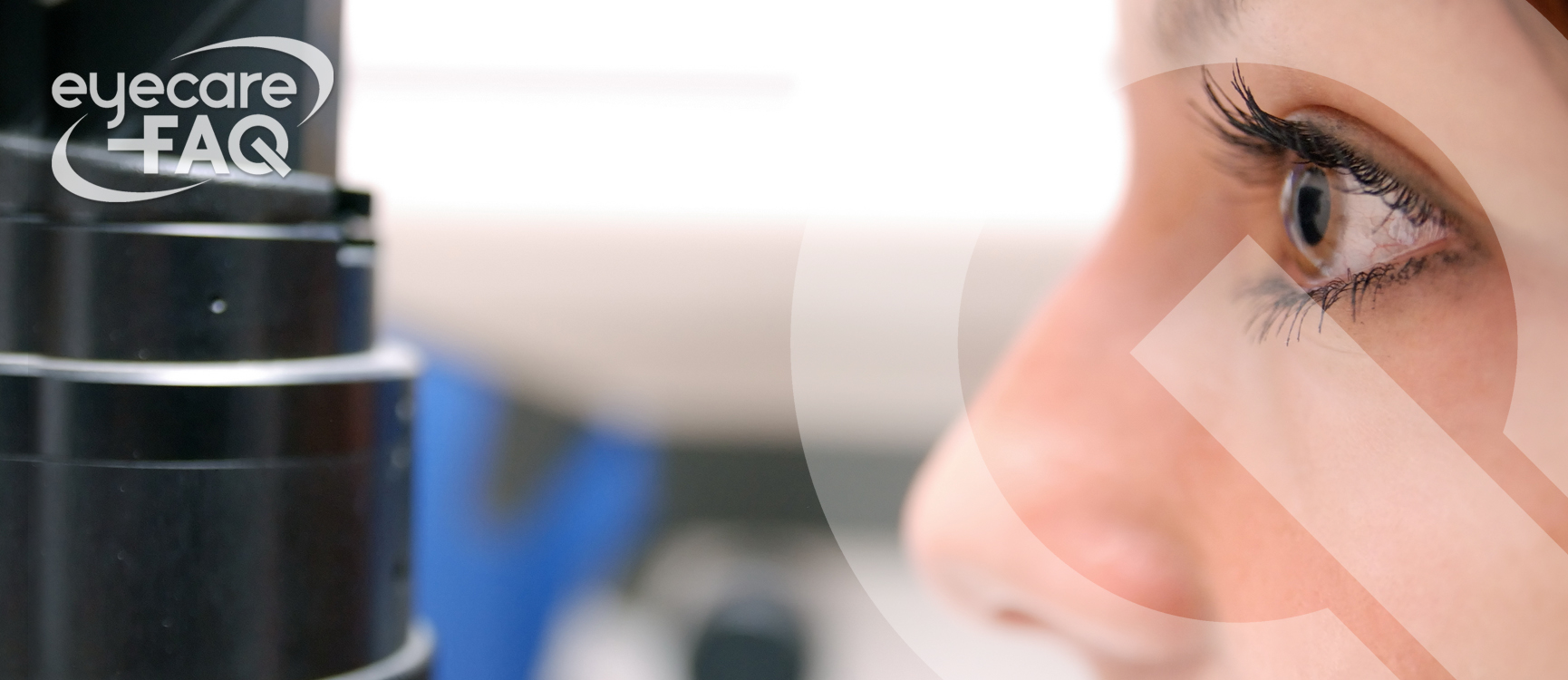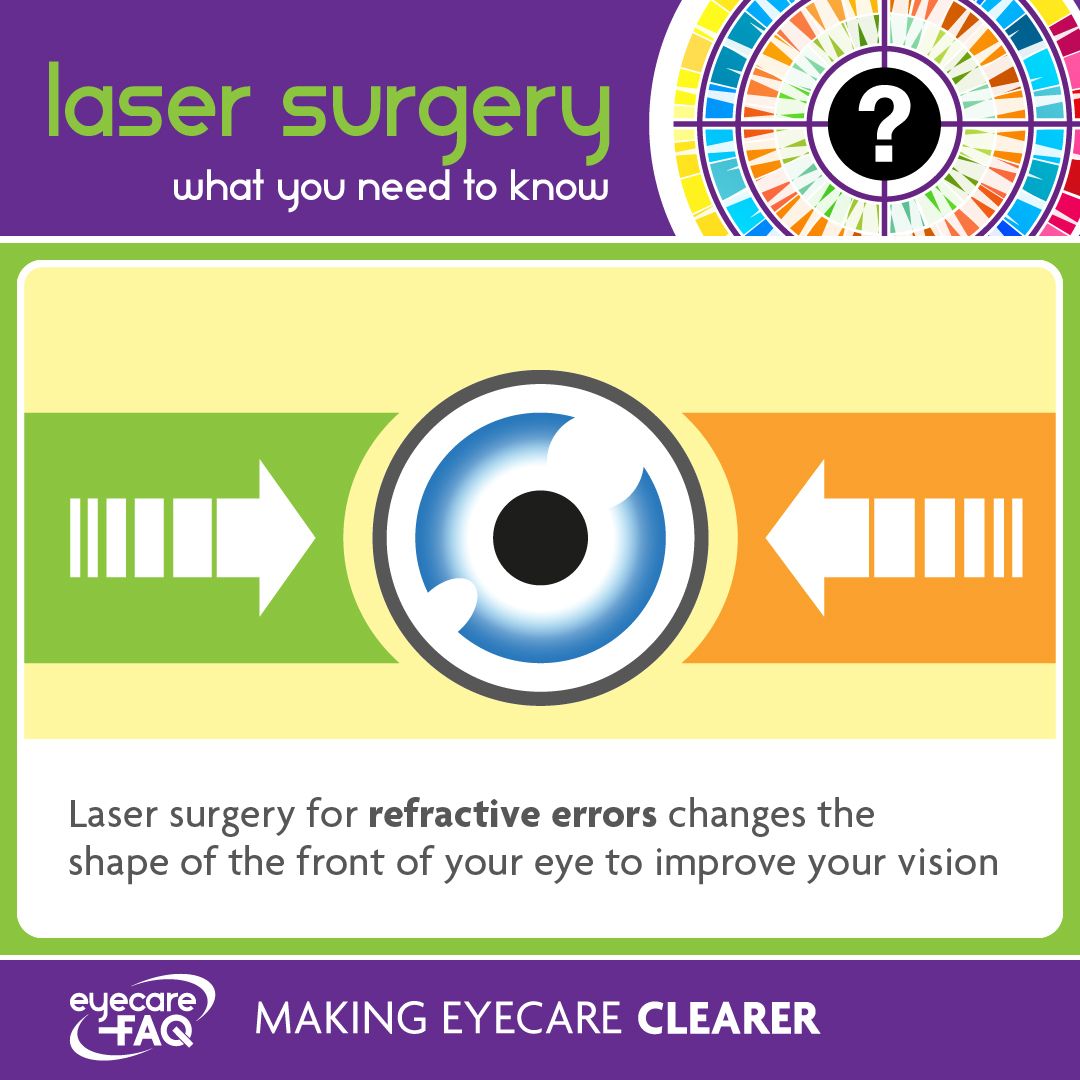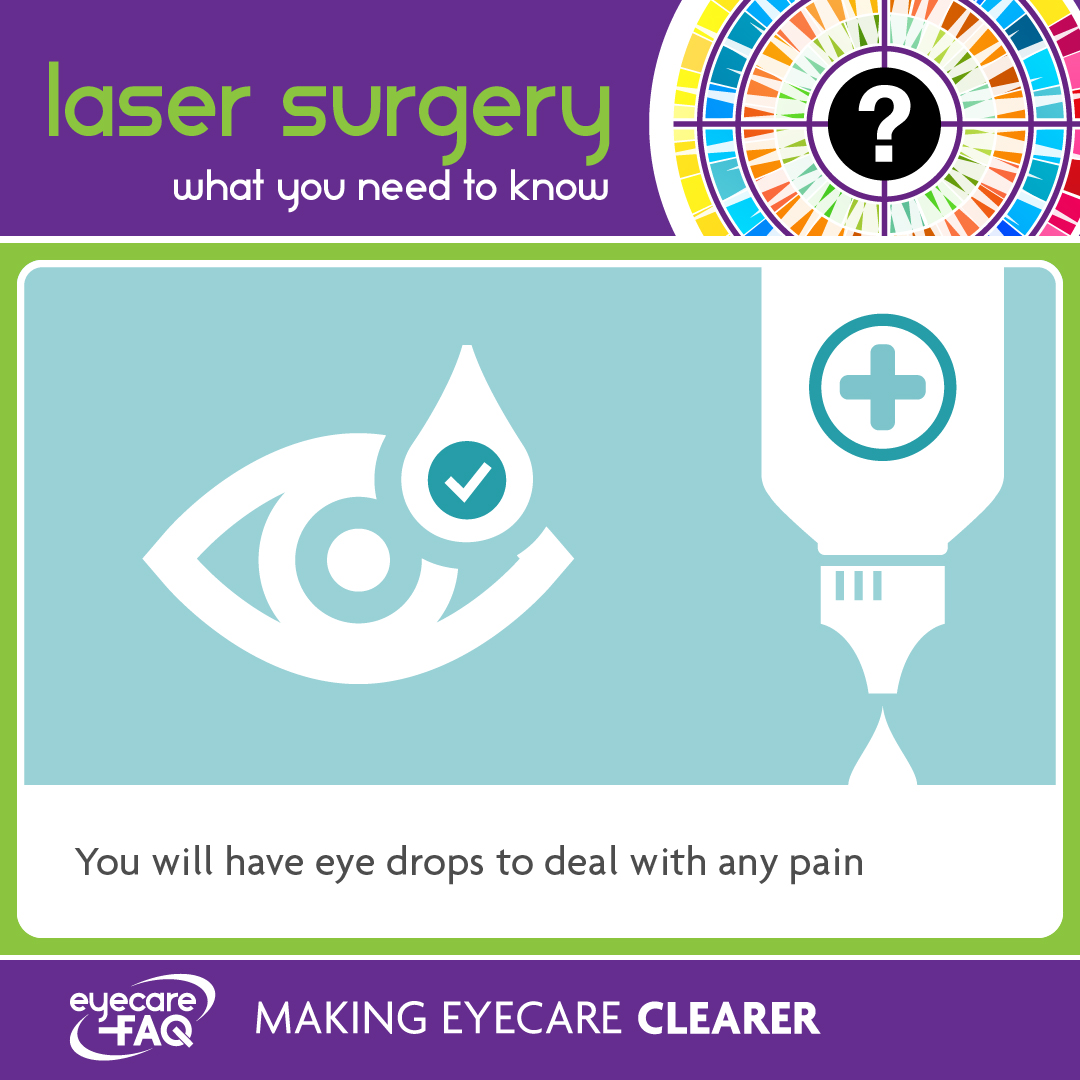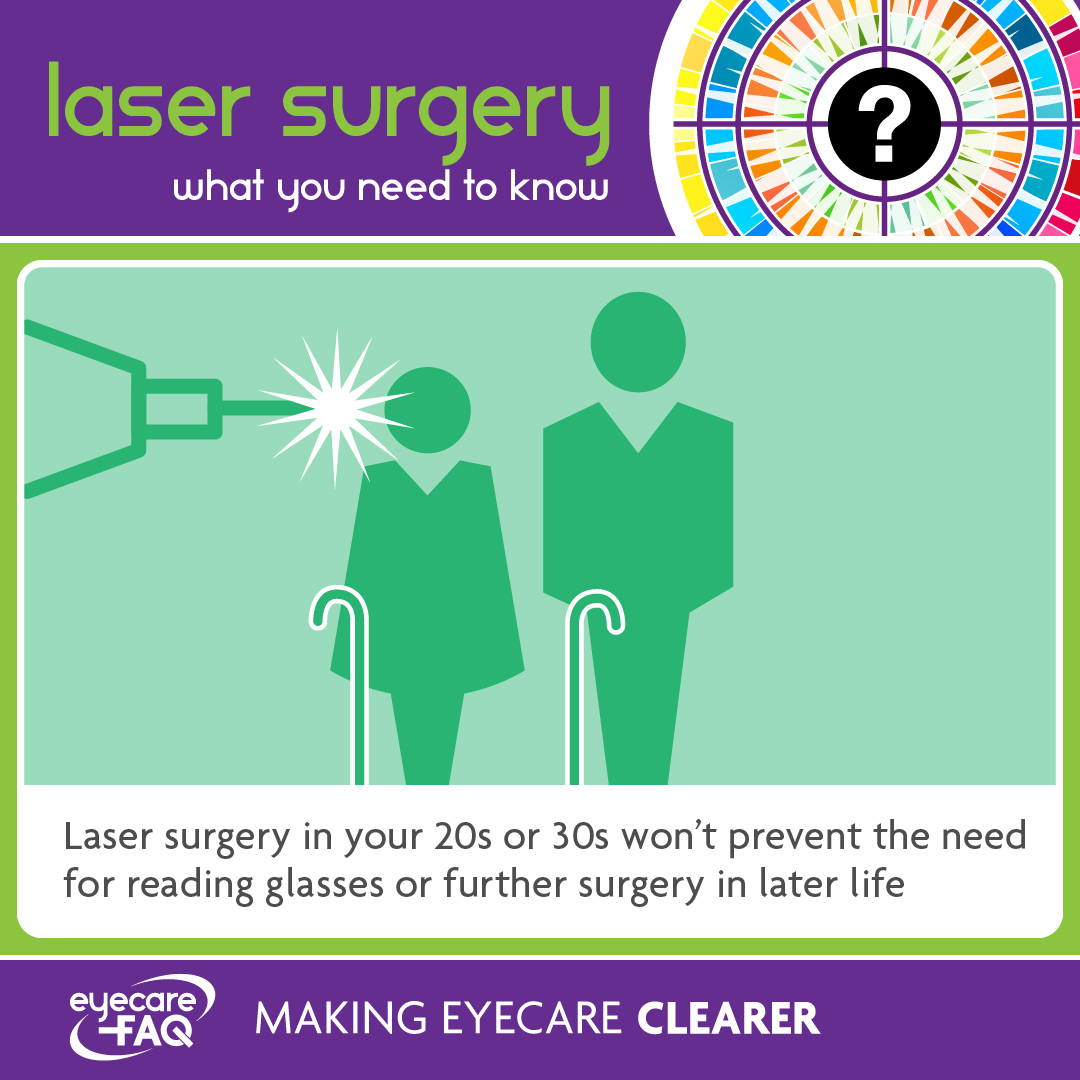What is laser surgery?
Laser surgery describes changing the shape of the front of your eye with the aim of improving your vision. While it aims to provide a ‘permanent’ solution, your eyes change with age, and someone who has laser surgery in their twenties or thirties may still need reading glasses or further surgery in later life. Any surgery has a small risk of side effects, so do seek medical advice before deciding that laser surgery is the solution for you.
What are the different types of laser surgery?
Laser surgery to improve your vision has developed rapidly over the last fifty years. The first technique, radial keratotomy, made radial slits in the front surface of the eye to change its shape. This improved vision, but caused the side effect of glare. In the 1970s, 80s and 90s a new type of laser was developed that could shave a very thin layer off the front surface of the eye, changing the way light was bent as it entered the eye, allowing for a sharper focus. This is called Photorefractive Keratectomy or PRK. Because the front surface cells of the eye were removed this meant that patients experienced pain after surgery. Another technique, LASIK (Laser Assisted In Situ Keratomileusis), or ‘flap ‘n’ zap’ was developed which involved cutting a thin flap from the front surface of the eye which could be replaced after laser surgery, reducing pain and discomfort and improving vision right away.
What is LASIK?
PRK (Photorefractive Keratectomy) was the first successful laser vision correction procedure. It is still in use today, but more people opt for LASIK as it offers better immediate results with less pain. However, outcomes are similar, and it is thought that, nerve regeneration in the eye’s surface may take place faster with PRK than with LASIK which cuts complications during healing. PRK may be safer if your cornea is too thin for LASIK surgery. While all laser surgery aims to provide a ‘permanent’ solution, your eyes change with age, and someone who has laser surgery in their twenties or thirties may still need reading glasses or further surgery in later life. Any surgery has a small risk of side effects, so do seek medical advice before deciding that laser surgery is the solution for you.
How are intraocular lenses used to improve vision?
Artificial lenses can now be surgically inserted into the eye to improve your vision. One type of lens is implanted in front of the iris, leaving your eye’s natural lens behind the iris. A different technique involves removing your natural lens and replacing it with an artificial lens of a different shape. According to the Royal College of Ophthalmologists, this technique is preferred to LASIK for the correction of higher refractive errors and for older patients. Ask your consultant which treatment is suitable for you. While surgery like this aims to provide a ‘permanent’ solution, your eyes change with age, and you may still need reading glasses or further surgery in later life. Any surgery has a risk of side effects, and adding an artificial lens has higher risks that laser surgery to the front of the eye, so do seek medical advice before deciding that laser surgery is the solution for you.
Does laser surgery hurt?
You will be given a local anaesthetic in the form of eye drops to help with any pain during surgery. With LASIK, you may feel pressure as the surgeon cuts the corneal flap. You may also have some discomfort or irritation for up to 24 hours after surgery. With PRK, you may experience irritation for a week or more as the surface of the cornea heals. You will have eye drops to use to relieve the pain over this period.
How does laser surgery improve my prescription?
The light that reaches your eye needs to come to a point on the retina, at the back of the eye, to give you clear vision. Light is bent (refracted) by the cornea, the clear surface at the front of the eye, and the crystalline lens inside the eye. If you are long or short sighted, the light does not come to a point in the right place. Laser surgery changes the curvature of the cornea, which alters the way the light bends to ensure it comes to a focus at the correct point.
I have astigmatism, is laser surgery suitable for me?
Most people have some degree of astigmatism, where the eye is rugby ball shaped rather than perfectly round. It is possible to treat astigmatism with LASIK, as lasers can now be programmed to reshape the cornea but there are limitations. Astigmatism of less than 3.00 dioptres (D) can be fully corrected with a single LASIK procedure, but higher levels may only achieve partial correction or may need further surgery. Astigmatism can also increase the cost of LASIK. While LASIK aims to provide a ‘permanent’ solution, your eyes change with age, and someone who has laser surgery in their twenties or thirties may still need reading glasses or further surgery in later life. Any surgery has a small risk of side effects, so do seek medical advice before deciding that laser surgery is the solution for you.
I am long-sighted, is laser surgery suitable for me?
If you are long-sighted, you will be able to see distant objects more clearly, but closer objects such as print are out of focus. Long-sightedness occurs when the eyeball is too short, the cornea is not curved enough and/or the lens inside the eye is not thick enough. Laser eye surgery treats long-sightedness by increasing the curve of your cornea, removing tissue from the edge of the cornea. This procedure was developed later than that for treating shortsightedness. People with high levels of long-sightedness may not be suitable for laser surgery, but there are other techniques to help. While surgery aims to provide a ‘permanent’ solution, your eyes change with age, and someone who has laser surgery in their twenties or thirties may still need reading glasses or further surgery in later life.
Any surgery has a small risk of side effects, so do seek medical advice before deciding that laser surgery is the solution for you.
I am short-sighted, is laser surgery suitable for me?
Laser surgery is safest and most successful for people with moderate levels of short-sightedness. Talk to your surgeon about the best techniques for you. While it aims to provide a ‘permanent’ solution, your eyes change with age, and someone who has laser surgery in their twenties or thirties may still need reading glasses or further surgery in later life.
Any surgery has a small risk of side effects, so do seek medical advice before deciding that laser surgery is the solution for you.
What are the risks of laser eye surgery?
There are risks with any surgery. According to the Royal College of Ophthalmologists, complications occur in less than 5 per cent of cases, but make sure your consultant outlines all the risks. Flap complications with LASIK arise in 0-4 per cent of cases, but can usually be corrected with little or no loss of vision. Some people have a problem with dry eyes in the months after surgery and artificial tear supplements may be needed long term. Many patients have experienced glare or halo effects when night driving, particularly just after treatment. This is more likely the higher the correction that has been made, but is rarely severe. In rare cases, excessive thinning of the eye wall can cause the shape of the eye to be unstable after treatment. Severe loss of vision is very unusual, but some patients could require corneal surgery or hard contact lenses to restore vision. You should find out exactly how frequently your surgeon has experienced complications and why.
Who can have laser surgery?
You need to be 21 or over to have laser surgery, with stable vision, so the surgeon knows that your eyes are less likely to change due to growth. Your eyes must be healthy, and the consultant will assess if your cornea is thick enough for the surgery. Some people with high prescriptions may not be suitable. You need to be in good health too. Ask your consultant for further discussion of whether you are a good candidate for the procedure.
Will I need time off work after laser surgery?
Where can I find out more about laser surgery?
Find more information from the Royal College of Ophthalmologists here, as well as its Questions Relating to Laser Eye Surgery
Read more about laser eye surgery in the NICE guidance, Photorefractive (laser) surgery for the correction of refractive errors.
Do I still need a regular eye examination once I have had laser surgery?
Yes! The eye test is a vital health check for your eyes, and can detect signs of sight threatening eye disease before you notice any problems. Even if your vision is great and your eyes feel good you should still have an eye examination every two years, or more often if advised.




